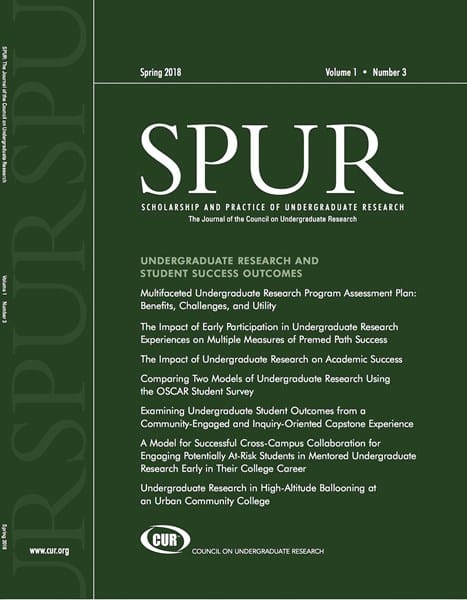SPUR (2018) 1 (3): https://doi.org/10.18833/spur/1/3/12
The authors examine the effects of undergraduate research experiences on key steps in the path to medical school, considering the case of an undergraduate research experience (URE) offered to first-year students that also might influence performance in large introductory science courses. Using a historical dataset of 15,000 first-year students, logistic and linear regressions were performed to better understand the influence of early UREs on different measures of college success. Immediate effects of an early URE on second-year course performance and very large effects on second-year retention are demonstrated. There also are delayed effects on taking the MCAT and medical school acceptance. Results demonstrate the importance of early UREs and their role in STEM student persistence.
More Articles in this Issue
- Practice‐ Catherine W. M. Chan, Prajukti Bhattacharyya, and Seth Meisel
SPUR (2018) 1 (3): https://doi.org/10.18833/spur/1/3/13 Abstract:The authors discuss the Research Apprenticeship Program (RAP) at University of Wisconsin–Whitewater, which pairs beginning students with mentors as paid research apprentices for one academic year. It seeks to encourage participation of students from underserved groups who are at higher risk of dropping out of college. RAP introduces students to mentored research, helps mitigate some of their financial needs, and gives students a sense of belonging and self-efficacy early in their academic careers. It also provides a first- to final-year pathway for students by fostering their transition to the Undergraduate Research Program and other applied learning experiences, thus ensuring their continuous engagement in high-impact practices. Preliminary data indicate that students and mentors value the program, and second- and third-year retention rates for RAP participants are higher than the campus retention rates.
- Assessment‐ Andrea J. Sell, Angela Naginey, and Cathy Alexander Stanton
SPUR (2018) 1 (3): https://doi.org/10.18833/spur/1/3/8 Abstract:This article assesses the accuracy of the assumption that undergraduate research leads to better student outcomes. In particular, it examines whether research involvement by undergraduates predicts subsequent academic success, as measured by grade point average (GPA). Consistent with predictions, results from a series of multiple regression analyses demonstrate that research involvement is associated with higher undergraduate GPA. This effect holds true even when controlling for numerous factors likely to affect both college GPA and the decision to become involved in research (e.g., high school GPA, the number of yearsin college, and parental college attendance). Additional analyses examine whether the timing of participation in research during a student’s college career influences their GPA. Implications for staff and faculty who oversee and promote undergraduate research are discussed
- ‐ James LaPlant, Editor-in-Chief
SPUR (2018) 1 (3): https://doi.org/10.18833/spur/1/3/11


